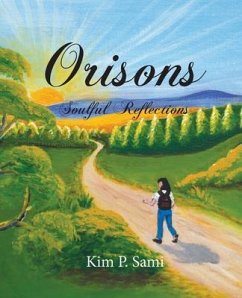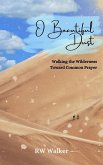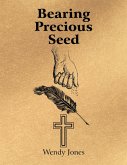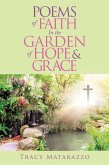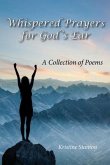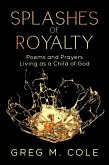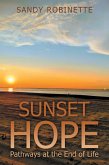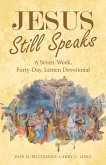An Orison is a prayer or plea to a deity. This comes from a Latin word meaning to speak, and it means to speak to God. (https://www.vocabulary.com>orison).
Orisons, is a beautiful and graceful collection of poems with something of the lyrical quality of psalms. Similarly to the psalms, Kim's poetry is not afraid to confront and voice intense experiences of suffering, rejection, dejection, hurt and grief. Particularly poignant in this collection is To be Seen, with its intense desire to be seen and accepted by those closest to her 'just maybe, someday'. But who or what is to be seen is not the same as that which is merely visible, since 'Just as the cover of a book is not its story/So mine is not me' as pithily insisted in Define Me. No, the desire is for the 'real me' to be found, 'The one that was lost, and is being found' (Refuge).
Loss of control over life and meaning is articulated poignantly in Vortex, a powerful lament which uses rhythm and metaphor with insight and skill to evoke a sense of profound desolation. The stark confronting metaphors in this poem's line, 'Spat out and left for dead', are evocative of the poetry of T.S. Eliot. As a reply to perhaps well-intentioned consolation, To Hold On is a delightful example of the power of rhythm and cadence. As a fitting finish to this foreword, a recommendation not to miss To the Younger Freer Me, Kim's enchanting ode to childhood, and to the child in all of us, that is so reminiscent of Les Murray's Spring Hail, with Kim rejoicing in 'Breaking free, breaking out, no reason left for doubt'.
Orisons, is a beautiful and graceful collection of poems with something of the lyrical quality of psalms. Similarly to the psalms, Kim's poetry is not afraid to confront and voice intense experiences of suffering, rejection, dejection, hurt and grief. Particularly poignant in this collection is To be Seen, with its intense desire to be seen and accepted by those closest to her 'just maybe, someday'. But who or what is to be seen is not the same as that which is merely visible, since 'Just as the cover of a book is not its story/So mine is not me' as pithily insisted in Define Me. No, the desire is for the 'real me' to be found, 'The one that was lost, and is being found' (Refuge).
Loss of control over life and meaning is articulated poignantly in Vortex, a powerful lament which uses rhythm and metaphor with insight and skill to evoke a sense of profound desolation. The stark confronting metaphors in this poem's line, 'Spat out and left for dead', are evocative of the poetry of T.S. Eliot. As a reply to perhaps well-intentioned consolation, To Hold On is a delightful example of the power of rhythm and cadence. As a fitting finish to this foreword, a recommendation not to miss To the Younger Freer Me, Kim's enchanting ode to childhood, and to the child in all of us, that is so reminiscent of Les Murray's Spring Hail, with Kim rejoicing in 'Breaking free, breaking out, no reason left for doubt'.
Dieser Download kann aus rechtlichen Gründen nur mit Rechnungsadresse in A, D ausgeliefert werden.

